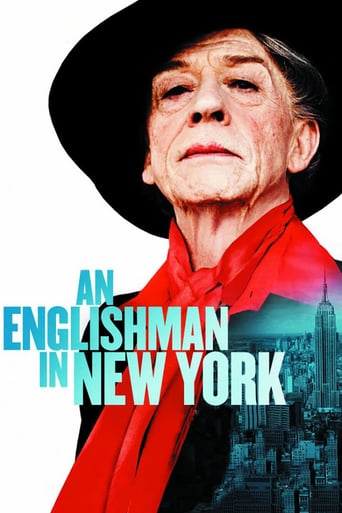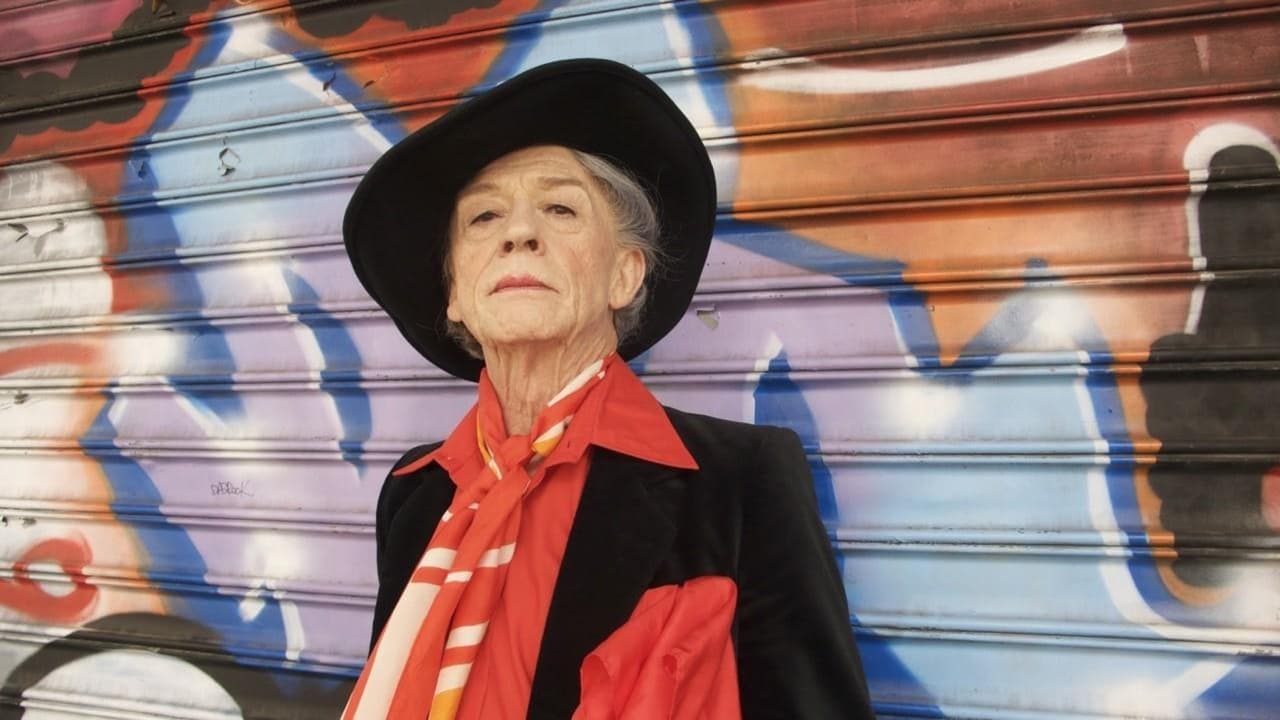Igenlode Wordsmith
This film was definitely superior to the BBC's new "Day of the Triffids" adaptation (which was scheduled directly against it), but is not the dramatic equal of the original "Naked Civil Servant", with which it will inevitably be compared. I suspect the main cause of this is that the source material simply doesn't provide a lot of scope: when a story starts with its protagonist in his seventies and having finally gained acceptance and even celebrity, the time-span is inevitably somewhat short and there isn't a great deal more that can happen to him. Even in situations which could, and would, have been threatening to the younger Quentin Crisp, his elder statesman status effectively restricts the repercussions.As a result, more or less the only 'plot event' of the film is the arrival of AIDS in New York, with even that seen largely through the effects on Crisp's career of a single dismissive quip (his reasoned attitude is that making too much of AIDS will only bolster public perception of homosexuals as disease-ridden outcasts, but this doesn't go down well among his target audience). Otherwise, "An Englishman in New York" consists largely of bons mots; little snippets of Crisp performing and delivering his famous lines, whether to an audience of one or to a small studio gathering.That said, given the limitations of its material the film manages to pull off the difficult trick of its predecessor, presenting its deliberately flamboyant, over-the-top protagonist as a sympathetic human being whose pose we not only condone but find ourselves applauding. I generally shy away from 'gay issues', but find myself feeling here for the people he meets and the prejudice he encounters, both from them and on their behalf. In some ways, it is as hard to be a determinedly effeminate homosexual among the butch 'clones' of an out-of-the-closet New York as among the disapproving middle classes of pre-war England.John Hurt does an excellent task in portraying the physical aging of the character, and of course it is a great bonus to have the same actor appearing in both films with a genuine generational time-lapse between them. It is just a truism that -- despite Quentin Crisp's much-repeated prediction that every year "things are going to get worse" -- happiness, as the proverb has it, simply doesn't make for such an enthralling story as do troubled times; and this is essentially a depiction of a man who has finally come to terms with the world, and it with him. As such it is well-meaning and pretty well executed, but not a particularly unmissable experience. And inevitably it is less touching and less striking than its predecessor.
Richard Buller
It is not necessary to have seen John Hurt's previous portrayal of Quentin Crisp in "The Naked Civil Servant" to appreciate this new film, but it is interesting to consider the subtle but different tones of each. The first was a cotton-candy confection that delighted on its own terms in spite of being based upon Quentin's much more somber autobiography. The current film is also sweet, but it incorporates some of the more serious issues of Quentin's later life, namely his seemingly indifferent, cavalier response to AIDS and how he dealt with growing old. Quentin was misunderstood in life because people, gay and straight, viewed him as a harlequin; but, anyone who has had the pleasure of reading his books, which this film curiously barely mentions, knows that he was a sober, ferocious intellect who, while flamboyant in approach and appearance, was a product of his time and came to us as a famous person, late in life, inevitably possessing, in the 1970's, '80's, and '90's, at least some of the Edwardian notions that informed his youth in the 1920's and '30's. This film achieves the formidable task of presenting Quentin both as he appeared publicly and as he thought privately. One can only imagine how difficult it must have been to construct the script. It was inspired to have utilized the framework of Quentin's relationships with various people upon which to construct the biography. By showcasing Quentin's friendships with a literary figure (his friend from "Christopher Street" magazine), an AIDS figure (the young, anguished painter), and a performing artist, the film reflects important facets of his personality and helps to illuminate the sometimes perplexing concept of the world according to Crisp or what he in life famously termed "Crisperanto." Quentin's dialog in the film may sound epigrammatic to some; but, that is how the gentleman actually spoke, and he had a great deal to say.These considerations are perilously academic, however. What is important is that the film is, in and of itself, magnificent. One is tempted to observe that John Hurt does Quentin better than did Quentin himself. It is difficult to take one's eyes off of this intricately prepared, compelling actor. How astonishing are those scenes that show Hurt as Quentin: playing Queen Elizabeth I in a film, waxing ruefully upon the ravages of aging; as he really was, in his tiny apartment, hair down, balding, elderly, alone; tilting his head back, upon theater stages, in cafés, or while simply walking down the street, to achieve that rollicking laugh that so soothed and beguiled. Because portraying Quentin is by definition flashy, Hurt at first may appear mannered and theatrical; but, if one watches closely, he will realize that the actor knows precisely when less is more. His performance is, in fact, careful. It is vigorous but not exaggerated, and the effect is remarkable.Those who approach "An Englishman in New York" armed with old political animosities from the Act Up era are missing out, really, because, as troubling as Quentin seemed in his attitude towards AIDS, he did try to atone for it, in his own way (even people with huge and gracious hearts can sometimes find it impossible to say "I'm sorry"), and because he blazed so uniquely and with such genius in innumerable other areas. As a social commentator, essayist, novelist, film critic, philosopher, public speaker, and most unlikely of fashion plates, Quentin Crisp had no peer. For better or worse, he remains a gay -- and literary -- icon. This film does justice to this totally unique man both as a legend and as he was at heart, a caring, emotional creature whose ultimate love and humility will likely outlive the hats, scarves, and tinted hair that memorably punctuated his public persona.
mukava991
One would think that anyone embarking upon a followup to the groundbreaking Naked Civil Servant of 30-plus years ago would at the very least try to honor the original with some kind of inspired vision, but no. Here we have a sort of biopic of one of the most stylish people of the late 20th century that itself boasts no style whatsoever. True, the filmmakers have assembled some outstanding actors - and handed them a chipped mug of drab gruel to work with. Everything in the infrastructure of this film is wrong, starting with the script, which is another one of those TV-movie condensations of great lives wherein every other line is a "famous quote" by the subject and every other scene is an in-your-face introduction to the next pivotal character in the subject's life. We get Swoozie Kurtz as a PR maven who promotes Crisp as a stateside entertainer; Denis O'Hare as the editor of a gay periodical who hires Crisp as film reviewer, becomes somewhat alienated from him when he appears indifferent to the passions of 80's AIDS activists, and then returns to the fold as a compassionate friend of the dying octogenarian; Jonathan Tucker (in a fine performance) as a shy, insecure painter of gay-themed canvases who is befriended by Crisp; and finally Cynthia Nixon as performance artist and Woman-About-Bohemia Penny Arcade who, intrigued by Crisp's persona, offers him a spot in her traveling cabaret act. Nixon is a persuasive and gifted performer but is given no chance by the script to embody the down-to-earth and streetwise Arcade. Crisp spent the last 20 years of his life in a one-room flat in an old tenement building in Manhattan's East Village. He famously said that he never cleaned because "after a few years the dust doesn't get any worse," or something like that. But looking at the depiction of that flat in this film you'd never get the flavor of that dustiness. He frequented a local coffee shop on a busy avenue and would be seen pretty much each day of the week sipping tea and watching the world go by. In this film we get a diner that looks like something on 12th Avenue by the Hudson River. Most of the "streets of New York" scenes have a sterile, unreal look with no sense of the period. The soul of this film is the great John Hurt in the title role. After nearly 35 years he can still grasp the essence of this peculiar post-Edwardian Englishman and put it across to third millennarians. His every line, every gesture is exquisite. In the later scenes he even modulates his vocal projection to suit that of a person whose life is winding down toward death. Crisp wrote shortly before he left this realm that when one grows very, very old one's skin takes on the character of a smelly overcoat that cannot be removed and one longs for death. One senses that feeling in Hurt's performance. So, for him and him alone this film is worth a look.
damientondleson
I saw this last night at the Tribeca Film Fest and holy god was it bad.. From the script to the editing to the acting to the cinematography-- none of it worked. Not to mention the set design/costumes were so distractingly wrong for the time period (it spans the years from the late 70s up until 2006 or so). Even John Hurt, who's usually an amazing actor, was so over-the- top ridiculous. Granted, Quinten Crisp is an over-the-top guy to begin with, but Hurt was given nothing to work with here. I don't know much else to say except the audience I saw it with absolutely loved it.. so maybe it's just me. But audiences love anything at film festivals when they're sitting next to the director and all the actors. It's not a very accurate test of how good the movie is or how well it will play. Personally, I thought this movie was terrible. On the other hand, it was so terrible that it was hilarious. Get drunk and give it a shot when it's on HBO in 2 years, if it ever makes it that far.



 AD
AD



